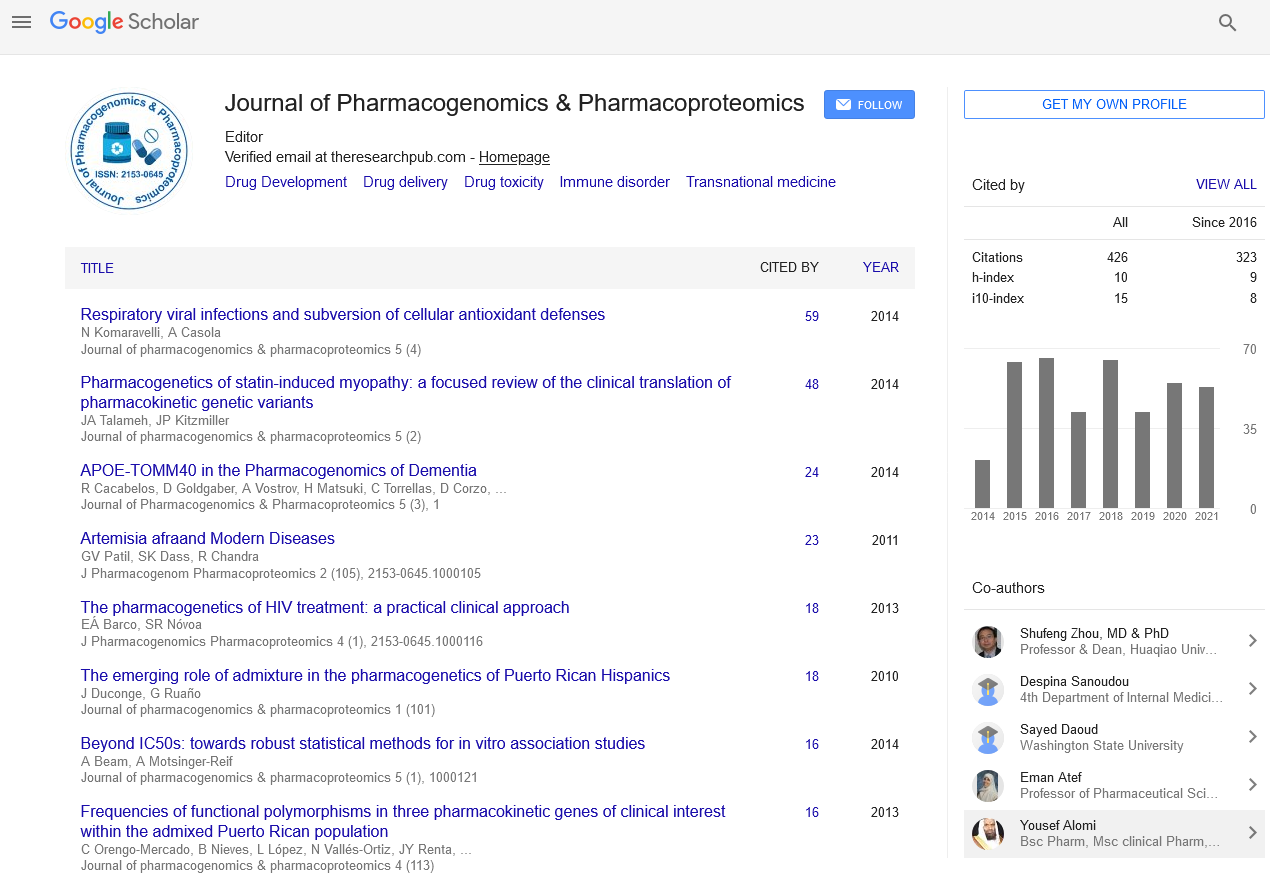Indexed In
- Open J Gate
- Genamics JournalSeek
- Academic Keys
- JournalTOCs
- ResearchBible
- Electronic Journals Library
- RefSeek
- Hamdard University
- EBSCO A-Z
- OCLC- WorldCat
- Proquest Summons
- SWB online catalog
- Virtual Library of Biology (vifabio)
- Publons
- MIAR
- Euro Pub
- Google Scholar
Useful Links
Share This Page
Journal Flyer

Open Access Journals
- Agri and Aquaculture
- Biochemistry
- Bioinformatics & Systems Biology
- Business & Management
- Chemistry
- Clinical Sciences
- Engineering
- Food & Nutrition
- General Science
- Genetics & Molecular Biology
- Immunology & Microbiology
- Medical Sciences
- Neuroscience & Psychology
- Nursing & Health Care
- Pharmaceutical Sciences
An ex vivo native environment precision medicine test shows high clinical correlation with responses to first line acute myeloid leukemia treatment
5th International Conference on Predictive, Preventive and Personalized Medicine & Molecular Diagnostics
December 01-02, 2016 Valencia, Spain
Julian Gorrochategui Guillen and Juan Ballesteros
Vivia Biotech, Spain
Scientific Tracks Abstracts: J Pharmacogenomics Pharmacoproteomics
Abstract:
We have overcome the limitations of 40 years of ex vivo testing by developing a novel test (based on studying the ex vivo sensitivity to drugs) to predict the complete remission (CR) rates after induction chemotherapy with cytarabine (Ara-C) and idarubicin (Ida) in 1st line AML. This has been an observational clinical trial where bone marrow samples from de novo AML adult patients in Spanish PETHEMA centers were included. Whole marrow samples maintaining their native environment were incubated for 48 hours in well plates containing Ara-C, Ida or their combination. Pharmacological responses are calculated using population models. Induction response was assessed according to the Cheson criteria (2003). Patients attaining a CR/CRi were classified as responders and the remaining as resistant. 390 patient samples were used to calculate the dose response curves synergism and 155 patients were used for clinical correlation. The strongest clinical predictors were the Area Under the Curve (AUC) of Ara-C (P=1.34E-05) and IDA (P=3.9E-05). The GAM models revealed a significant relationship (R2=0.45 and deviance explained=45%) between these predictors and higher probabilities of post-induction resistance. The test obtains a high specificity and positive protective value (95% and 83%) and a lower sensitivity (53%) with a general prediction of 83%. Interestingly, the 5 cases that the test identify as resistant but were clinically sensitive have high level of minimal residual disease. On the other hand, the test does not properly identify 22/155 that is clinically resistant and the test predicts as sensitive. This mismatched subgroup mimics the problems from molecular markers where a resistant clone present in a minority of leukemic cells cannot be detected yet drives the patient response. This novel test is able to predict the clinical response to Ida+Ara-C induction with overall correlation and predictive values of 83%, higher than ever achieved. Thus this novel test may be valuable information to guide 1st line patient therapy.
Biography :
Joan Ballesteros has completed his PhD in Mount Sinai Hospital, New York. In 1999 he has founded Novasite Pharmaceuticals in San Diego, CA as CSO pioneering screening by flow cytometry. In 2006, he moved the technology to Spain to launch Vivia Biotech as a Chairman and CSO, to develop a personalized medicine test for hematological malignancies, in collaboration with the Spanish hematologist association Pethema. He has authored more than 40 scientific publications and is an Inventor in 4 patents.


